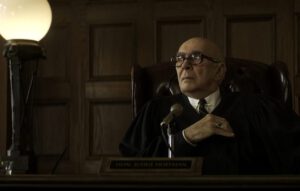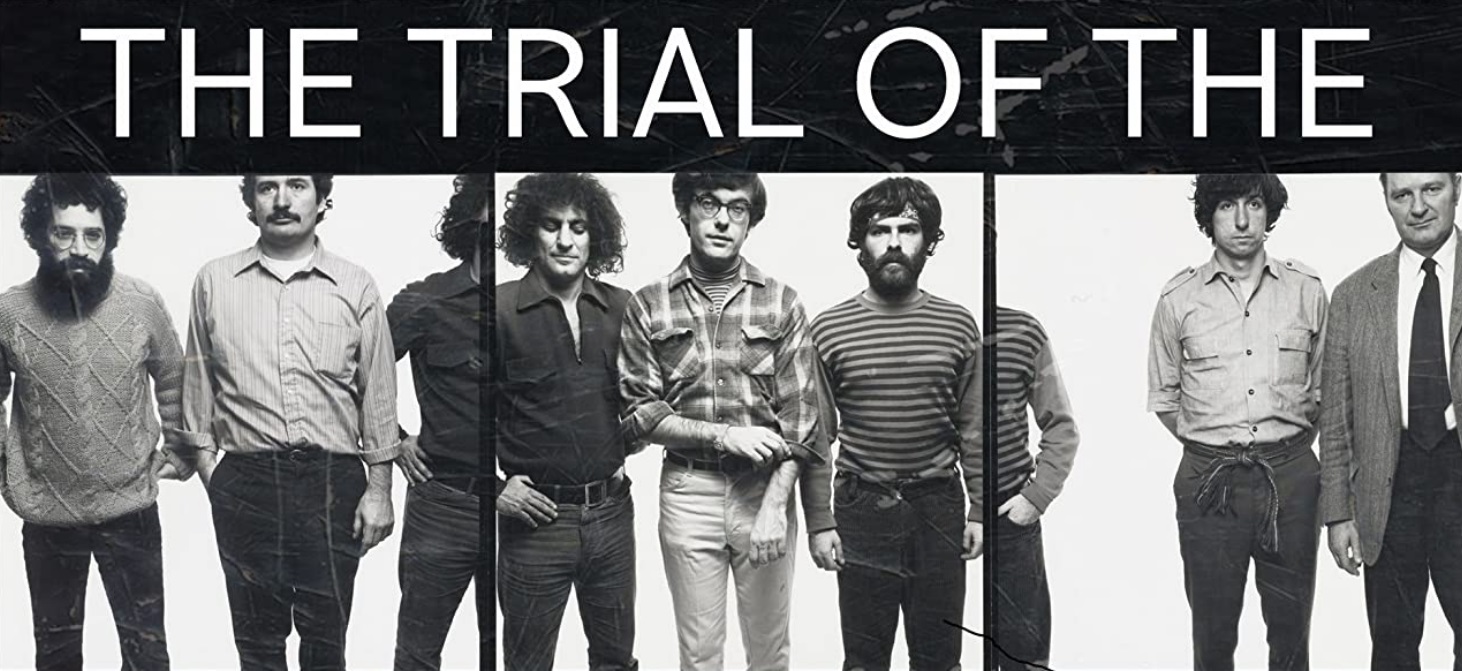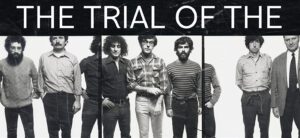Movie Info
Movie Info
- Director
- Aaron Sorkin
- Run Time
- 2 hours and 9 minutes
- Rating
- R
VP Content Ratings
- Violence
- 5/10
- Language
- 2/10
- Sex & Nudity
- 0/10
- Star Rating
Relevant Quotes
I charged your judges at that time: “Give the members of your community a fair hearing, and judge rightly between one person and another, whether citizen or resident alien.”
for justice will return to the righteous,
and all the upright in heart will follow it.
West Wing lovers might well be ecstatic while viewing writer and director Aaron Sorkin’s new film that Netflix picked up after the pandemic forced Paramount Pictures to scrap plans for a theatrical release. Sorkin’s film is full of the conflict between the powerful and the vulnerable and the fast-paced repartee that made the White House-based series so enjoyable to watch. The infamous trial, dragging out over 4 ½ months, was almost ready-made for a film, with its colorful, controversial characters, ranging from the flamboyant rebels, to the Constitution-bashing judge, to a prosecuting attorney who apparently had doubts about the validity of the government’s case. And the parallels to today’s politicization the US Justice department are chillingly made in an early scene set in the office of the U.S. Attorney General Mitchell (John Doman).
The film sets us up for the trial by an opening montage of news footage of the 60s– President Lyndon B. Johnson, becoming more and more enmeshed in the Vietnam War, doubling the national draft call from 17,000 to 35,000 per month; the televised draft lottery in which those with low numbers are called up; quick shots of the assassinations of Martin Luther King, Jr. and Robert F. Kennedy; anti-war demonstrations; and more.
We are then introduced to the various protesters who are planning to come to Chicago to demonstrate against the War because the Democrat’s national convention is set there: sober-minded Tom Hayden (Eddie Redmayne), leader of the Students for a Democratic Society; the flippant Jerry Rubin (Jeremy Strong) and Abbie Hoffman (Sacha Baron Cohen) of the Youth International Party, better known as the Yippies; Bobby Seale (Yahya Abdul-Mateen II), the militant national chairman of the Black Panthers, Hayden’s friend Rennie Davis (Alex Sharp), John Froines (Daniel Flaherty) ,Lee Weiner (Noah Robbins), and the older, long-time activist David Dellinger (John Carroll Lynch). The latter would make a good subject for his own movie, having been an ambulance driver during the Spanish Civil War, a pacifist CO during World War Two, Civil Rights and anti Vietnam War activist (visiting both Hanoi and Saigon), and colleague of such other radicals as Dorothy Day and A.J. Muste.
Although the protesters all see little difference between Presidential candidates Hubert Humphrey and Richard Nixon, they differ greatly about ways of resisting the war. Hayden prefers using electoral means of reversing policy; Rubin and Hoffman are revolutionaries; Seale advocates suspicion of all whites and Black militancy, including guns to defend themselves; and Dellinger, the oldest who went to jail as a CO during the Second World War, preferring Gandhi’s way of nonviolent resistance to injustice.
The idea that such disparate leaders could have conspired together should have seen ludicrous, but the Nixon administration apparently was not concerned about facts, hence the scene in Attorney General John Mitchell’s office in which he gives US Attorney Richard Schultz (Joseph Gordon-Levitt) and the latter’s boss US Attorney Tom Foran (J.C. MacKenzie) their marching orders for the prosecution of the activists on the charge of criminal conspiracy and crossing state lines to incite a riot. Schultz is seen as doubting the validity of the charges but agrees anyway to take what promises to become a famous case. Mitchell reveals his political motives, apparently resulting from his resentment against a slight by his predecessor, Ramsey Clark (a wonderfully performing Michael Keaton). Clark , resigning just before Mitchell took over the office, had investigated the charges against the activists and had determined that the violence in Chicago was due to the police department and not the outsiders. Mitchell is determined to discredit Clark and to deal a blow to the antiwar movement.
The film jumps over the Democratic Convention and the riots to the beginning of the trial, during which there will be many flashbacks to the events in the parks and streets of the Windy City. Tom Hayden (Eddie Redmayne) is not pleased with their lawyer William Kunstler (Mark Rylance), so they bring in another lawyer, Leonard Weinglass (Ben Shenkmar), to assist. The activist’s feelings change as Kunstler ably defends then and stands up to the biased Judge Julius Hoffman (Frank Langella).
The trial has often been referred to as a circus, the court room at times as chaotic as the parks and streets had been during that summer. A circus implies humor, and the incompetent Judge Hoffman provides plenty, beginning with the hapless Prosecutor Schultz’s opening statement to the jury when the judge interrupts him by declaring that he wants people to know that though he and Abby Hoffman share the same last name, they are not related. He botches several other names, getting David Dellenger’s name mixed up, first with that of the name of the old pocket pistol and then with the name of the infamous bank robber John Dillinger.

Far worse is the judge’s treatment of the defendants and defense lawyers. Bobby Seale, who had only been in Chicago for 4 hours during the riots, is upset because his lawyer is in the hospital for surgery and the judge will not allow him to represent himself. With Chicago Black Panther leader Fred Hampton sitting behind him and occasionally offering advise, Seale’s attempt to ell Judge Hoffman his wish to have his own lawyer not only falls on deaf ears but results in the judge citing him several times for contempt of court. Both lawyers and most of the defendants also are cited by Hoffman—the judge gives out his contempt like a busy parent giving out candy on Halloween.
I am sure that, besides rearranging some of the events for dramatic purposes, the filmmakers took some other liberties with the history of the trial, but the following really did happen:
-Before his case was separated and then dropped, Bobby Seale really was punished by the judge, Hoffman telling the marshals to take the prisoner to another room and treat him as he deserved (reminding me of some of the harsh treatment a Presidential candidate suggested that protestors and prisoners being pushed into a van should undergo!) After beating him, they bring the bound-up Seale back with a gag forced into his mouth, and then chain him to his chair!
-The two Yippies did put on black robes to mock the judge, and when ordered to remove them, revealed that they were wearing police uniforms.
-Former AG Ramsey Clark did agree, against government protests, to testify that his investigation cleared the defendants. The jury had been sent to another room, and when the prosecution object to the jurors being allowed to hear him, Judge Hoffman sustained it.
-Abbie Hoffman really did reply to the judge’s question, “Mr. Hoffman, are you familiar with contempt of court?” with, “It’s practically a religion for me, sir.”
I have just learned that the sentencing scene was indeed “a liberty” that was taken for dramatic effect. Throughout the film one of the defendants writes in his notebook the names of the U.S. soldiers killed that day in Vietnam. I believe it is Tom Hayden who says several times that the trial is not about themselves, but about the War and its victims and the need to end it. Thus, in the film judge says to Hayden that before sentencing that Tom Hayden can make a statement if it is brief and repentant, in effect, offering him a chance for leniency if he (the judge) is pleased by it. Instead, Tom does something else that is much, much longer, and so effective that even Prosecutor Schulze joins the audience in rising out of respect. This fictional ending is dramatically stirring, but to read how the actual way the trial ended, click here.
Aaron Sorkin has been wanting to make the film ever since over 10 years ago he was contacted by Steven Spielberg. Various factors prevented this, but Sorkin did work on a script. He culled the over 22000 pages of court records and spent time talking with Tom Hayden. The writer/director reports that the court records cast little light on the relationships of the Chicago 7 to one another, so Hayden’s input was vital for this aspect. As we see in the scenes set in Kunstler’s Hyde Park “Conspiracy House,” the defendants argued among themselves because of their differing views. They might have been united in their opposition to the Vietnam War, but they were deeply divided on ideology and methods.
There is humor, largely supplied by the two Yippie defendants, but there are tragic events taking place outside the courtroom. Besides the daily casualties of the War, Black Panther leader Fred Hampton and a colleague are killed during a massive police raid on his Chicago apartment—and several other Panthers are wounded. As usual, the police justified their fusillade of almost 90 bullets as justified because the Panthers shot first. Hampton himself was fast asleep when shot because an FBI infiltrator had drugged his food and drink, and thus could not have fired a gun. The later federal investigation revealed that only one bullet had been fired at the raiders, that Fred Hampton had been murdered. None of this is shown except for the now famous photographs of the bullet-wracked apartment taken right afterward.
The outcome of the case was a mixed affair, triggering still more litigation. One thing that did result—the fear of US Attorney Schultz, “On top of everything, we’re giving them what they want: a stage and an audience,” was realized. And the men they put on trial–especially the two Yippies, the head of the SDS, and a lawyer with a long history of resistance to injustice—were fully prepared to turn the courtroom into a stage where they could dramatize their resistance to the War. The reporters covering the trial loved it.
There are many sobering events depicted, such as the prosecution’s assertion that Abbie Hoffman intended to foster a riot by his speech in Grant Park when he told protesters, “Make sure that if blood is going to flow, it will flow all over the city.” What he meant by this, you can find out by watching what is one of the most entertaining, as well as enlightening, political films you are likely to see. With its revelation of the government’s massing its powers, including the FBI and police, to stifle dissent by discrediting its opponents, we see that the current administration’s attempts to use the DOJ against its enemies is not unique. That old maxim, attributed to various leaders, is still true, “Eternal vigilance is the price of liberty.” Thus, long after current abuses of power have passed into history, such films as this one will still be relevant—and important.
This review will be in the Nov. issue of VP along with a set of questions for reflection and/or discussion. If you have found reviews on this site helpful, please consider purchasing a subscription or individual issue in The Store.
Netflix


